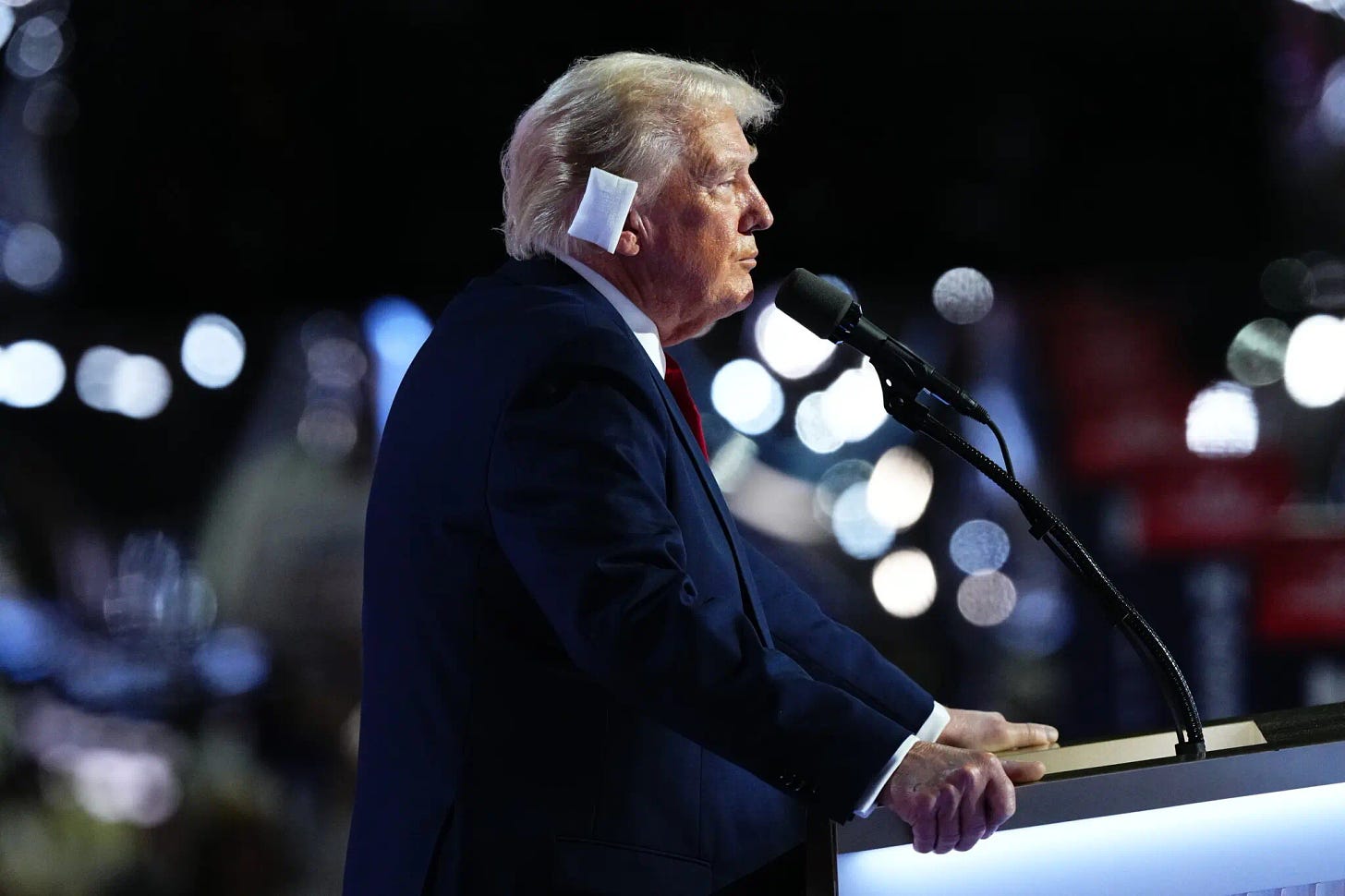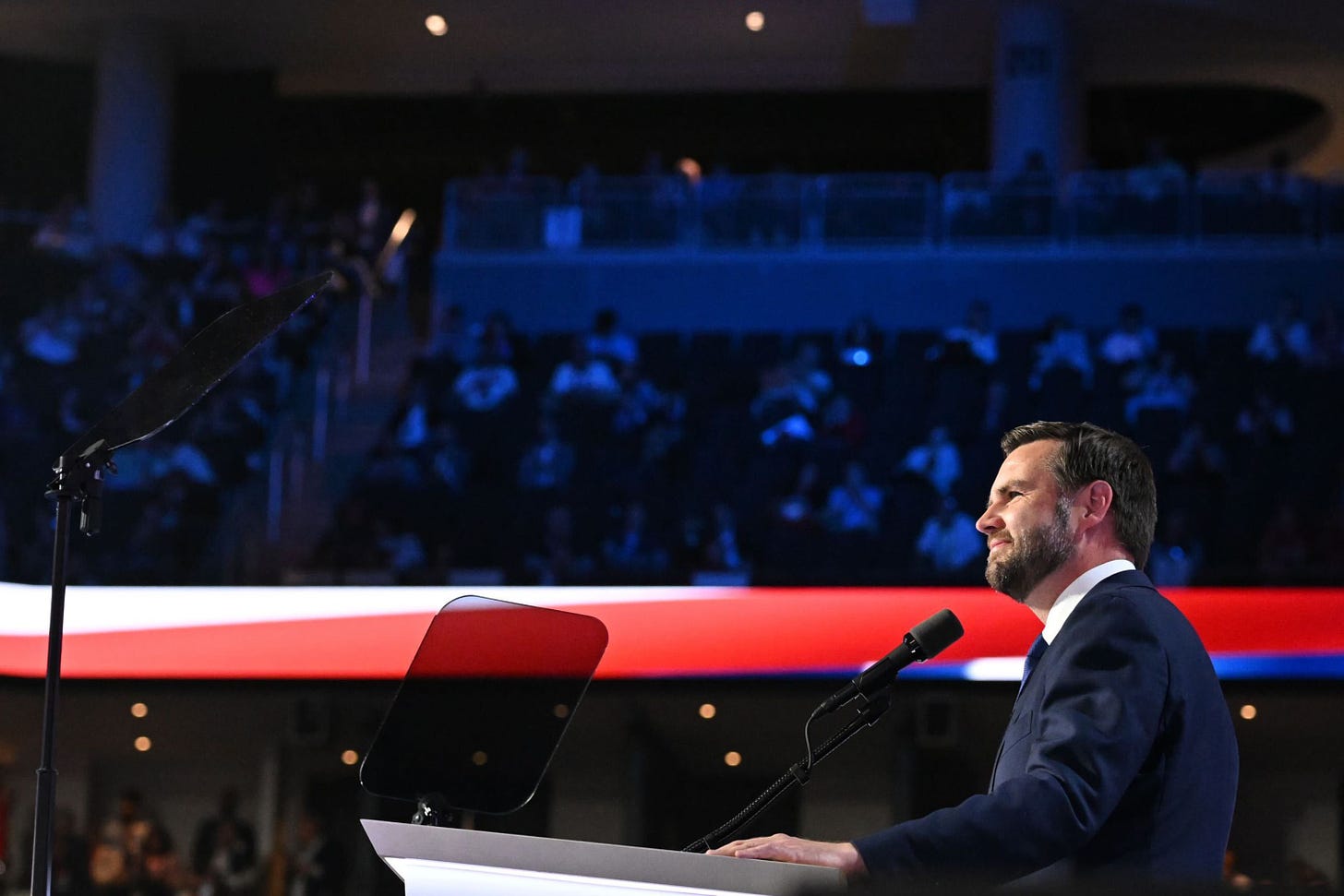The selection of J.D. Vance as the Republican Party vice-presidential nominee gives the MAGA movement a potential ideological clarity and intergenerational continuity. The Senator from Ohio is 39 years of age, and he formulates an anti-illegal immigration, anti-woke, patriotic, pro-family, economic nationalism that proposes decisive governmental action to expand American manufacturing and productivity and raise the wages of American workers. He promises to defend abandoned communities in middle America and to defend the interests of workers and the nation, and not the interests of big corporations. He formulates a partial reconceptualization of American ideology, by seeking to bring the Republican Party beyond Reaganism, neoliberalism, neoconservatism, and globalism, as he sounds like a classical liberal Democrat in speaking of state action in defense of workers. In this reconceptualization, he is consistent with the 2024 Republican Party Platform, which of course was written by MAGA and Trump supporters in the Party, although Vance develops the specifics of economic policies further than the platform.
The reconceptualization of Vance and the Republican Party Platform, however, is partial. It remains trapped in the assumptions of American imperialism and American arrogance, with barely hidden disdain for the rest of the world, especially the world beyond the West.
Damon Linker, in a guest post in Persuasion entitled “Vance the Convert,” describes Donald Trump as “a man of instincts and impulses, not ideas,” who has been able to appeal to the public with anti-establishment positions on issues like immigration and the culture war, but who does not know how to govern. The unexpected electoral success of Trump, Linker observes, has stimulated an effort by conservative intellectuals and a small number of elected officials to “forge a new right-populist ideology and policy agenda from scratch.”
Linker considers Vance to be a part of this process. “Vance cares about ideas, and he has a mind capable of synthesizing them in a compelling way.” He writes that Vance has emerged since 2021 as “an aspirational right-populist who blends together staunch and unapologetic social conservatism, support for the kinds of economic regulations more often associated with progressives like Elizabeth Warren, and a desire for retrenchment in foreign policy, including the withdrawal of support for Ukraine in its conflict with Russia.”
In an interview with The New York Times columnist Ross Douthat on June 13, 2024, Vance recounts that around 2018, he arrived to understand that both center-left liberals and center-right conservatives are doing very well, and both “have an incredible blind spot about how much their success is built on a system that is not serving people who they should be serving.” Already well known and praised for “Hillbilly Elegy,” but with recognition that his intention in writing the memoir was frequently not well understood, Vance felt the need to go in a new direction with respect to his public persona, which coincided with his discovery that “part of the reason the anti-Trump conservatives hated Donald Trump was that he represented a threat to a way of doing things in this country that has been very good for them.” Elite conservatives and elite liberals, including himself at one time, tend to focus on Trump’s style in their rejection of him, ignoring the importance of his substantive proposals with respect to foreign policy, trade, and immigration. Vance further recounted that when he first met Trump in 2021, he found that the former President is “much more complex than the media gives him credit for,” and he found that he is personally likeable.
In the interview with Douthat, Vance discusses his ideas for a comprehensive populist economic agenda. He criticized the increasing tendency of “the postwar American order of globalization” to rely on cheaper labor abroad as well as cheaper labor at home through uncontrolled immigration. Both types of cheaper labor create downward pressure on American wages; and immigration, in addition, results in upward pressure on the costs of housing and medical services. Vance proposes economic policies that do the reverse, policies which create upward pressure on wages and downward pressure on the cost of housing and services.
Vance maintains that the U.S. has had very little creative policy innovation during the last forty years, seeking ways to employ “the seven million prime-age American men who are out of the labor force and find some way to reengage them,” rather than replacing “the McDonald’s worker from Middletown, Ohio, who makes $17 an hour with an immigrant who makes $15 an hour.” Automation, he maintains, such as using kiosks at McDonald’s, is a good thing, because automation, even if it replaces some workers, generates new jobs, while the workers who remain at McDonald’s will be able to preserve their wage level.
Vance asserted that the Social Security problem should not be addressed by telling the elderly that they are on their own. “Take those seven million prime-age men not in the labor force. Those people are supported, very often, by public resources. You shift millions of those men from not working to working; you increase wages across the board; you increase tariffs; and I think that you buy yourself a whole hell of a lot more than the nine or 10 years that the actuaries say that we have [until Social Security becomes unsustainable]. You get more revenue, yes, from tariffs, but from more people being in the labor force, from higher productivity growth, from higher wages, from transitioning young people who are not working into the work force.”
Vance further maintained that “military power is downstream of industrial power.” He observed that the United States is still the world’s military superpower, but because China has become more powerful industrially than the United States, China will have a more powerful military in twenty years. He proposes the rebuilding of American industry to enable the preservation of American military strength.
In a guest essay published in The New York Times on April 12, 2024, Vance explained his Senate vote against the Biden administration aid package of more than $60 billion to Ukraine as well as his opposition to any proposal for the United States to continue funding the war in Ukraine. He maintained that the United States does not have the manufacturing capacity to provide weapons that Ukraine needs to win the war. The U.S. government has an unrealistic policy with respect to Ukraine, and the administration is heading toward another U.S. foreign policy failure. He calls for negotiation with Russian President Vladimir Putin, seeking the security of both Ukraine and Russia based on the physical territorial boundaries in place. He maintains that the resources being sent to Ukraine could better be used for a Patriot missile system for the defense of Taiwan, as a deterrent to possible Chinese action against Taiwan.
In his address to the Republican National Convention on July 17, Vance delivered a speech that was crafted to appeal to the workers and to middle America. He declared that the nation needs a leader who defends the workers and defends American companies.
We need a leader who fights for the people who built this country. We need a leader who is not in the pocket of big business but answers to the workingman, union and non-union alike. A leader who won’t sell out to multinational corporations but will stand up for American companies and American industry.
He spoke of the exclusive privileges of the few, and the gap between the few and the many, and he spoke of the failure of the government.
For decades, [the] divide between the few, with their power and comfort in Washington, and the rest of us only widened. From Iraq to Afghanistan, from the financial crisis to the Great Recession, from open borders to stagnating wages, the people who govern this country have failed and failed again.
He spoke of the concerns that drive the MAGA Movement.
It’s about the auto worker in Michigan, wondering why out of touch politicians are destroying their jobs. It’s about the factory worker in Wisconsin who makes things with their hands and is proud of American craftmanship. It’s about the energy worker in Pennsylvania and Ohio who doesn’t understand why Joe Biden is willing to buy energy from tinpot dictators across the world when he could buy it from his own citizens right here in our own country.
He committed to American citizens and workers, and he promised that the second Trump Administration will rebuild American manufacturing.
We are done catering to Wall Street; we’ll commit to the workingman. We’re done importing foreign labor, we’re going to fight for American citizens and their good jobs and their good wages. We’re done buying energy from countries that hate us. We going to get it right here from American workers in Pennsylvania and Ohio and across the country. We’re done sacrificing supply chains to unlimited global trade. We are going to stamp more and more products with the beautiful label “Made in the USA.” We are going to build factories again, putting people to work making real products for American families made with the hands of American workers. We will protect the wages of American workers and stop the Chinese Communist Party from building their middle class on the backs of American citizens.
In an address that stressed his roots in Appalachia and the challenges that confronted his single mother, he concluded, “To the people in all the forgotten communities, I promise that I will be a vice president who never forgets where he came from.”
§
Anti-Imperialism is nowhere to be found
Neither J.D. Vance nor the MAGA-inspired Republican Platform come close to an anti-imperialist formulation. When they speak against war, they do not speak against imperialism, but imperialist overreach. They speak of a strong military that ensures the fortress-like defense of American territory, without the need for involvement in the numerous conflicts in other regions of the world, except for occasional effective surgical strikes. They know nothing, or care, of the world beyond the West. They have not heard the call of the nations of the Global East and South for a dialogue of civilizations, mutually beneficial trade, and cooperation.
The absence of anti-imperialist consciousness is a serious flaw and a historic error, for two reasons. First, by failing to escape imperialist assumptions, the nation leaves itself vulnerable to future ill-conceived wars. Secondly, armed with a myopic and ignorant view of the world, the MAGA Movement and its leaders are not able to discern that cooperation with the nations of the Global East and South would provide fertile ground for the creativity necessary for the mutually beneficial trade that would provide for the common development and common prosperity of all.
America needs patriotic economic nationalism, but permeated with an internationalist spirit.

Trump addresses RNC on July 18
It was a calm, relaxed, and perhaps more spiritual Donald Trump who addressed the Republican National Convention just six days after an assassination attempt. He provided a detailed description of the attempt from the vantage point of his personal experience. He praised the bravery of the Secret Service and the calm comportment of the people at the rally. He suggested that his survival, which resulted from the coincidental movement of his head to look at a banner to the side of the stage, was providential. He did not speculate concerning the motives of the shooter, and he blamed no one.
His speech overused the word “great.” It displayed his habit of repeating the final words of sentences. It exhibited his penchant for exaggeration. Nonetheless, he came across as sincere and personable, and as a man convinced of his mission to make America great again. He reviewed many of the agenda items of the Republican Party Platform and the MAGA Movement, contrasting his policies and proposals with those of the Biden Administration, which he characterized in a personable manner as very bad for the nation. He mentioned his opponent’s name only once, but the contrast with the Biden Administration as well as the Obama and Bush administrations was constant. He stressed the need for the country to unify, overcoming ideological, political party, and racial and ethnic divisions. He expressed his conviction that the success of his policies will forge a unity behind the MAGA agenda. He further expressed the view that vice-presidential nominee J.D. Vance will be around for a long time.
On foreign policy matters, the former President appears to have much confidence in his personal capacity to pressure or personally persuade leaders of other nations, thus avoiding U.S. entrance into conflicts. His comments in foreign policy matters make evident a myopic view of the world that lacks consciousness of American imperialism. In this limitation, Trump is consistent with the Republican Party Platform and the discourses of vice-presidential candidate J.D. Vance.
§
Final Note
Given its blindness to imperialism, there is need for an internationalist deepening of the MAGA Movement. In 2022, there emerged an effort among self-described communists who were alienated from leftist discourse to engage the MAGA Movement, seeking to broaden its perspective. At that time, I wrote four articles on the initiative, which called itself MAGA Communism. The purpose of the commentaries was to point to a reconceptualization from the Left of American ideology, a reconceptualization tied to political practice.
“#MAGACommunism: A synthesis of left and right in defense of the people,” September 23, 2022
“The insights of MAGA Communism: On leftists, partisans, and the sacred,” October 11, 2022
“A critique of MAGA Communism: On partisans, cultural wars, and the vanguard of the people,” October 14, 2022
“Haz Al-Din on Marxist-Leninist theory: Communism restores the organic sociality ruptured by modernity,” October 18, 2022
A free subscription option is available, with capacity to read, send, and share all posts. A paid subscription ($5 per month or $40 per year) enables you to make comments and to support the costs of the column; paid subscribers also receive a free PDF copy of my book on Cuba and the world-system. Ten percent of income generated through subscriptions to the column is donated to the Cuban Society for Philosophical Investigations.



